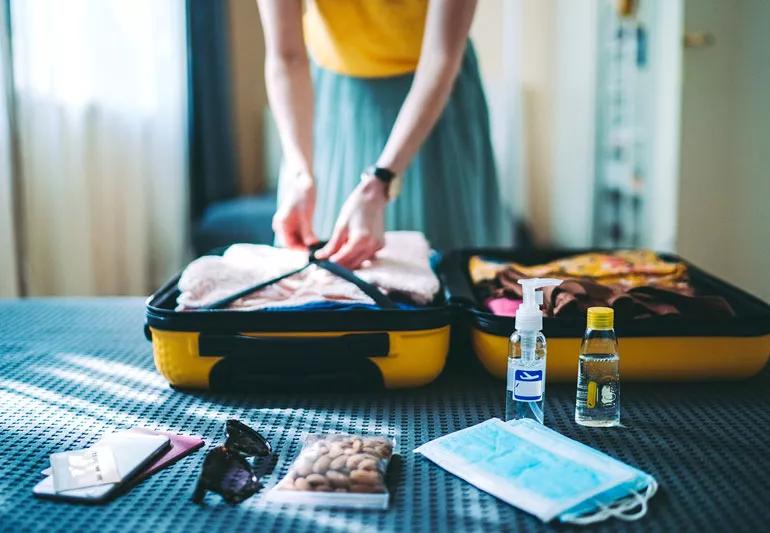Practical advice to cope, avoid symptoms

For many of us, the best time of year to take a vacation is also the best time to catch a big whiff of pollen and get sidelined with a super-sized sneezing fit.
Advertisement
Cleveland Clinic is a non-profit academic medical center. Advertising on our site helps support our mission. We do not endorse non-Cleveland Clinic products or services. Policy
If you’re getting your travel plans ready for when it’s safe to travel again after the COVID-19 pandemic, if you or a family member has allergies — whether seasonal, animal, dust or food-related — it’s a good idea to work them into your trip preparations so you’re not caught unaware.
For seasonal allergies, allergist-immunologist David Lang, MD, says it’s a good idea to research your destination in advance to determine what allergens are prevalent during the time of year you’re traveling. The U.S. Environmental Protection Agency’s Airnow allows you to compare the best months for air quality in states and counties throughout the country.
For instance, Ragweed is the dominant outdoor allergen in the Midwest and on the East Coast from mid-August to the frost, while in California, the major allergen is Bermuda grass.
If you’re driving to your destination, run the air conditioner in the car for 10 minutes before you leave and check to make sure vents are working properly. It’s best to leave in the early morning or late evening, when you’ll likely encounter less traffic and better air quality.
Once you’ve arrived at your hotel, use the air conditioning there also. With the air conditioning on and the windows closed, you can reduce indoor pollen exposure by more than 90%.
Advertisement
Dr. Lang says he’s not encouraging people to hibernate indoors, but “the more you use the air conditioning when you are in buildings and cars, the more likely you will be to reduce your level of exposure.”
Shower and change clothes if you’ve been outdoors to get rid of some of the pollen you’ve been carrying around.
If you know you’ll be visiting friends or family who have pets (after the pandemic, of course), you may want to stay in a nearby motel to get an overnight break from all that dander. Just be sure you stay in a hotel that doesn’t allow pets (or where they won’t affect you).
He remembered the need for advance planning when he checked into a hotel, only to find his next-door neighbor strolling down the hall with a dog.
“If you’re allergic to pets, you might want to call ahead,” Dr. Lang says.
When it comes to pets, you may have an increase in exposure and not necessarily be able to avoid it. “You may get exposed to cats and dogs, or people who are pet owners are walking around with the allergens on their clothing,” Dr. Lang says.
He recommends doing all you can to avoid exposure and to take your allergy medication.
Dust mites are a common problem when you stay in motels. You can, at least partially, combat them by bringing your own pillow and hypoallergenic cover.
“That would be helpful,” he says, although, “an increase in the level of exposure associated with staying in certain hotels is probably unavoidable.”
At home, people with food allergies have control over ingredients. However, if you’re on the road or in restaurants, you don’t have that same level of control.
So ask questions. “Be vigilant for exposures that can increase your level of symptoms,” he says. “Inquire about the contents of particular food items so you are certain you’re not exposed.”
Also, consider lodging that includes a kitchen or kitchenette. Wash dishes before you use them. Always carry an EpiPen with you in case of a severe reaction. Better yet, pack two EpiPens.
Having injectable epinephrine on hand is highly recommended if your allergies are severe, he says.
People who have experienced allergic reactions from insect stings such as from a yellow jacket, hornet, honeybee or wasp need to carry adrenaline or epinephrine with them — and also see a board-certified allergist for venom immunotherapy, Dr. Lang says.
Aside from that, he counsels common-sense avoidance measures: “You should avoid picnic areas, and you don’t want to walk barefoot through a park,” he says. “I tell patients that, other than making honey, a bee’s job is to pollinate flowers, so the more you look and smell like a flower, the more attracted bees are to you.”
Advertisement
Dr. Lang offers these tips for people traveling by plane, including advice for international travel:
Advertisement
Learn more about our editorial process.
Advertisement

Most antihistamines, like Zyrtec, are OK, but avoid decongestants for at least the first trimester

You can now get lifesaving epinephrine in a nasal spray and prefilled syringes

Drowsiness is a side effect of inflammation, disrupted sleep and, sometimes, your allergy medicine

If you’re sensitive to aspirin or other salicylates, limiting exposure is the best remedy

Mold exposure can cause allergic reactions, asthma and skin rashes

If allergies have you coughing and sniffling all night, try showering before bed, keeping the windows closed and propping your head up

If allergies make your mornings a slog, consider closing the windows and showering at night

When the trees start to bloom, your allergies can come to life — medications, closing the windows and keeping clean can help

Wearing a scarf, adjusting your outdoor activities and following your asthma treatment plan can help limit breathing problems

Your diet in the weeks, days and hours ahead of your race can power you to the finish line

When someone guilt trips you, they’re using emotionally manipulative behavior to try to get you to act a certain way